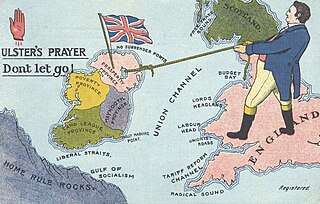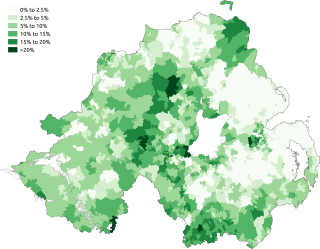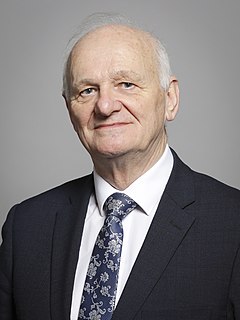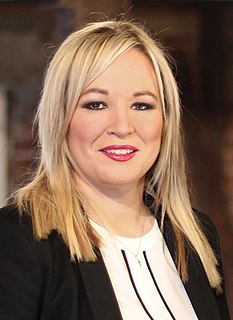Related Research Articles

The Ulster Unionist Party (UUP) is a unionist and conservative political party in Northern Ireland. Having gathered support in Ulster, the northern province in Ireland, during the late-nineteenth and early-twentieth centuries, the party governed Northern Ireland between 1921 and 1972. The UUP and its predecessors have been the traditional Unionist voice in Ireland. It was supported by most unionist voters throughout the conflict known as the Troubles, during which time it was often referred to as the Official Unionist Party (OUP). Between 1905 and 1972, its peers and MPs took the Conservative whip at Westminster, in effect functioning as the Northern Irish branch of the Conservative and Unionist Party. This arrangement came to an end in 1972 over disagreements over the Sunningdale Agreement. The two parties have remained institutionally separate ever since, with the exception of the 2009–2012 Ulster Conservatives and Unionists electoral alliance.

Ian Richard Kyle Paisley, Baron Bannside, was a Northern Irish loyalist politician and Protestant religious leader who served as leader of the Democratic Unionist Party (DUP) from 1971 to 2008 and First Minister of Northern Ireland from 2007 to 2008.

The Democratic Unionist Party (DUP) is a unionist and loyalist political party in Northern Ireland. It was founded in 1971 during the Troubles by Ian Paisley, who led the party for the next 37 years. Currently led by Jeffrey Donaldson, it is the joint-largest party in the Northern Ireland Assembly, and is the fifth-largest party in the House of Commons of the United Kingdom. The party has been described as right-wing and socially conservative, being anti-abortion and opposing same-sex marriage. The DUP sees itself as defending Britishness and Ulster Protestant culture against Irish nationalism. The party is Eurosceptic and supported Brexit.

Unionism in Ireland is a political tradition on the island that professes loyalty to the Crown and constitution of the United Kingdom. Once the overwhelming sentiment of a then-ascendant minority Protestant population, in the decades following Catholic Emancipation (1829) it mobilised to oppose the restoration of an Irish parliament. In the century since Partition (1921), as Ulster Unionism its commitment has been to the retention within the United Kingdom of the six Ulster counties that constitute Northern Ireland. Within the framework of a peace settlement for Northern Ireland, since 1998 unionists have had to accommodate Irish nationalists in a devolved administration, while continuing to rely on the connection with Great Britain to secure their cultural and economic interests.

The Irish language is a recognised minority language in Northern Ireland. The dialect spoken there is known as Ulster Irish. Protection for the Irish language in Northern Ireland stems largely from the European Charter for Regional or Minority Languages.

Martin McGuinness was an Irish republican politician from Sinn Féin and a leader within the Provisional Irish Republican Army (IRA) during The Troubles. McGuinness was the deputy First Minister of Northern Ireland from May 2007 to January 2017.

Peter David Robinson is a retired Northern Irish politician who served as First Minister of Northern Ireland from 2008 until 2016 and Leader of the Democratic Unionist Party (DUP) from 2008 until 2015. Until his retirement in 2016, Robinson was involved in Northern Irish politics for over 40 years, being a founding member of the DUP along with Ian Paisley.

Sylvia Eileen, Lady Hermon is a retired Unionist politician from Northern Ireland. She served as the Member of Parliament (MP) for the constituency of North Down from 2001 to 2019.

Robert Thomas William McCrea, Baron McCrea of Magherafelt and Cookstown is a retired Free Presbyterian minister from Northern Ireland. A former Democratic Unionist Party (DUP) politician, he represented South Antrim and Mid Ulster as their Member of Parliament (MP), representing Mid Ulster from 1983 to 1997; then South Antrim between 2000 to 2001, and then again from 2005 to 2015.

Major Robert Alan McFarland is an Independent Unionist politician in Northern Ireland, who was a Member of the Legislative Assembly (MLA) for North Down from 1998 to 2011.

The Garibaldi School is a co-educational secondary school and sixth form built in the 1960s. It is situated near to the edge Clipstone village, Nottinghamshire but lies within Mansfield District Council's Newlands electoral ward and teaches young people from Clipstone and the Forest Town area of Mansfield. It provides pupils from 11-16 with a GCSE education and 16 to 18 year-olds with an advanced GCE or VCE education through their sixth form.

Caitríona Ruane is a Sinn Féin politician. She was a member of the Northern Ireland Assembly for South Down from 2003 to 2017, and served as the Principal Deputy Speaker of the Northern Ireland Assembly from 2016 to 2017.

Michelle O'Neill is an Irish politician who served as deputy First Minister of Northern Ireland from 2020 to 2022. She has served as Vice President of Sinn Féin since 2018 and has been a Member of the Legislative Assembly (MLA) for Mid Ulster since 2007.
The Northern Ireland Conservatives is a section of the United Kingdom's Conservative Party that operates in Northern Ireland. The party won 0.3% of the vote in the 2017 Northern Ireland Assembly election and 0.7% of the vote in the 2019 United Kingdom General election in Northern Ireland.
The Ulster Conservatives and Unionists, officially registered as the Ulster Conservatives and Unionists – New Force (UCUNF), was an electoral alliance in Northern Ireland between the Ulster Unionist Party (UUP) and the Conservative Party.

Paul Jonathan Givan is a Unionist politician from Northern Ireland representing the Democratic Unionist Party (DUP). Givan served as First Minister of Northern Ireland from June 2021 to February 2022.

The 2010 United Kingdom general election in Northern Ireland occurred on 6 May 2010 and all 18 seats in Northern Ireland were contested. 1,169,184 people were eligible to vote, up 29,191 from the 2005 general election. 57.99% of eligible voters turned out, down 5.5 percentage points from the last general election.

The 2022 Northern Ireland Assembly election is expected to elect 90 members to the Northern Ireland Assembly. It is due to be the seventh assembly election since the assembly was established in 1998.
Neamh Woods is a Northern Ireland netball international and a Tyrone Ladies' Gaelic footballer. She was a member of the Northern Ireland teams at the 2018 Commonwealth Games and the 2019 Netball World Cup. As a Ladies' Gaelic footballer she played for Tyrone in the 2010 All-Ireland final. She captained Tyrone when they won the 2018 All-Ireland Intermediate Ladies' Football Championship. She was an All Star in 2008 and 2018 and was the 2018 TG4 Intermediate Player's Player of the Year.
References
- 1 2 3 "Call to merge rural schools". Belfast Telegraph digital. Belfast Telegraph. 16 March 2015. Retrieved 25 December 2019.
- 1 2 "Sir Robert Salisbury". About Ulster University. Ulster University. Retrieved 21 December 2019.
- ↑ Sarah Strickland (8 August 1996). "Take one dreary school and add a magician ..." The Independent. Retrieved 26 December 2019.
- ↑ "Sir Robert Salisbury". NI Department of Education. Retrieved 21 December 2019.
- ↑ Boyett, Inger; Don Finley (1994). "Entrepreneurship and Change in the Public Sector: The Garibaldi School". Journal of Small Business and Enterprise Development. 1 (3): 14–21. doi:10.1108/eb020941 . Retrieved 25 December 2019.
- ↑ Haigh, Gerald (2007). Inspirational, and cautionary tales for would-be school leaders. Taylor & Francis. p. 85. ISBN 9780203933060.
- ↑ Coleman, Marianne; Lesley Anderson (2001). Managing Finance and Resources in Education. p. 46.
- ↑ Second knighthood honour for Garibaldi - Mansfield woman's OBE 'shock' Chad, Mansfield local newspaper, 14 June 2014. Retrieved 26 2 January 2009
- ↑ "NI education status 'an enduring myth' says Sir Robert Salisbury". BBC News. BBC. 27 September 2011. Retrieved 25 December 2019.
- 1 2 Robbie Meredith BBC News NI Education Correspondent (28 February 2019). "Officials 'talking NI schools into gutter', says Paisley". BBC News Northern Ireland. BBC. Retrieved 25 December 2019.
- ↑ "Official Report: Minutes of Evidence Committee for Education, meeting on Wednesday, 11 March 2015 Inquiry into Shared and Integrated Education: Sir Robert Salisbury". AIMS Portal. Northern Ireland Assembly. Retrieved 25 December 2019.
- ↑ John Manley (2 June 2018). "The Casual Gardener: Bob and Rosemary Salisbury living the Dream in Co Tyrone". The Irish News. Retrieved 21 December 2019.